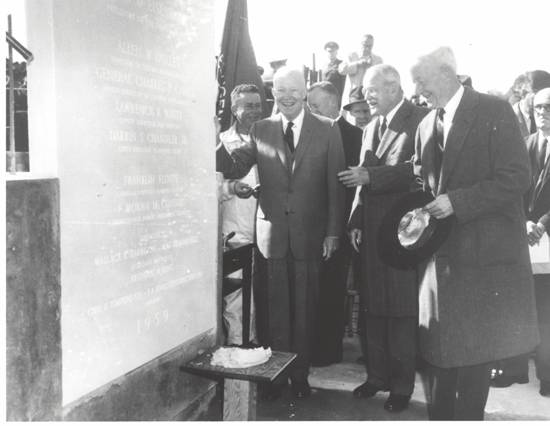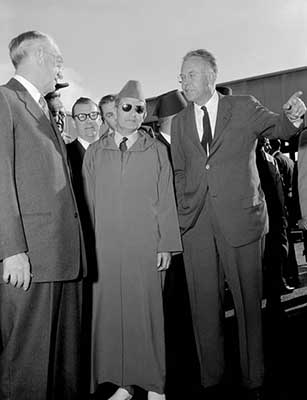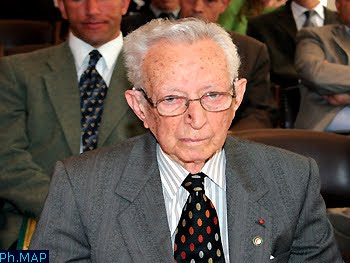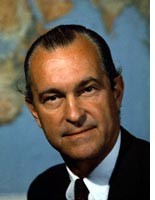A NOTE FOR THE RECORD

(Ike and Alan Dulles at the dedication of the Original Headquarters Building at Langley. Image CIA).
OK- the big news of the night was that Heather went three-for-three, drove in two RBIs and had no errors. The Naturals of the Nature Conservatory, going head to head with the World Wildlife Fund, still went down by ten runs in the Tuesday softball league. Heather was MVP for the Naturals.
Which was going to be the topic of the morning missive today, but I don’t have action images to convey the drama. Heather was in left center, 2nd base and behind the plate for one inning while someone went for a beer. Heather reports she was able to hang on to her red Solo cup throughout the cycle.
Anyway, the alternative was to share the high drama of the Big Pink financial committee last night, but frankly I don’t think anyone out there is ready for that sort of excitement just yet. There is plenty of time for that as the fiscal year plays out.
Instead, something flew over the transom that reminded me of one of our favorite bartenders, Sammy. He is from Morocco; and an athlete of imposing height and movie-star black wavy hair and blazing dark eyes. He reminds me periodically that with all the trouble in the Maghreb these days, we have a long shared history, and you have to remember that people are people, good and bad. There are a lot of good people in North Africa, and a smaller set of them who should be killed at the first opportunity.
It is important to know the difference.
We have to remember the good as we pursue the bad. We were talking about that with JPeter, who over the months has let some amazing things drift out over the Amen Corner at the Willow Bar. He grew up in some extraordinary places, because his Dad was a charter member of the Christians in Action up at Langley.
JPeter is a good son, taking care of his Mom as we tried to take care of ours. He is the kid who is here for her, since his Dad passed away last September: “Dan, recently of Berkeley, died suddenly yet quietly while landing at Dulles International Airport. Born July 8, 1924 to Herman and Camma Wages in Winder, Georgia.
He fought in WW II, in the Third Army under George Patton 1944-45. He received a BA from Furman University in 1947 and a MA from UNC Chapel Hill. While working towards a PHD in history at Columbia, he obtained a Fulbright scholarship to London.
In 1953, he joined the newly formed CIA serving in various overseas assignments in the Department of State’s Foreign Service. After retiring in 1979, he worked as a stock-broker, then moved to Berkeley, California in 1999. He was a charter member of The Greatest Generation, and a participant in the beginning of the Cold War, and the maintenance and structure of the bi-polar world oriented around the pillars of the United States and the Soviet Socialist Republics. I don’t know what he thought of what has become of it now.
JPeter had a document that he thought I might be interested in, and I was. Apparently Dan had been talking to the family at a gathering a couple years ago, and decided to write down the full account. His time at Langley overlapped that of our departed pal Admiral Mac Showers, and I prowled the halls there when the Global War on Whatever was still new and we thought we were going to roll up the bad guys like a bad Persian rug. Here is a little Cold War story we thought you might enjoy:
“Recently at a lunch with several family members I reminisced about one of my accomplishments as a CIA employee in the days of the cold war about which I was especially pleased and which resulted in an organization that exists to this very day. It has occurred to me that I should perhaps write an account of this for very limited distribution to a few select people.
I had been selected to go to the State Department’s Arabic language school, a full time program of 12 months in the Foreign Service Institute (FSI) in Washington to be followed by another 12 months of study at the FSI school in Beirut, Lebanon. Sally and I were married shortly after Christmas in 1953 and after a short honeymoon in Carmel we flew to Beirut.
The tour in Beirut was extended another 6 months because the State Department was running low on travel money, and they had none to spend on transfers that were not absolutely necessary. We had no objection at all to having our time in Beirut, which we loved, extended.
When we did return to Washington I was assigned to the North Africa section of the Africa Division. My immediate boss was Warren Hamilton, who after a period as a pilot in the Lafayette Escadrille in the First World War remained in Paris to start a tourist company. It soon failed, and he got a job with the U.S. State Department as a courier delivering diplomatic pouches in Europe.
Diplomatic Pouches in those days traveled by steamship from Washington to France and were then delivered by couriers to embassies and legations in other European countries.
By the time World War II started, Warren was the Chief of the Courier Service in Europe, although he also continued to serve as a courier himself. At the time of Pearl Harbor he happened to be in Berlin. After an exchange of officials he was back with Americans, and he soon was with the Office of Strategic Services (OSS) in North Africa.
Although during the Second World War both the Europeans and the Arabs favored the Allies, after the war was over they wanted to become independent of France (Tunisia and Morocco were French protectorates, but Algeria was an integral part of France, despite the fact that the population was largely Arabic.) In his days with the OSS during the war Warren cultivated the leading figures of North Africa and after the war fully supported the natives’ aspirations for independence from France.
Shortly before I was assigned to the Africa division, Warren had been sent on a tour of the area to renew his friendships there for their intelligence value. He returned, and he had met various old friends and in addition, had been introduced by one of them to Sultan Mohammed V of Morocco and they waited for Warren to write up his report. No written report appeared, and the powers that be were very annoyed.

(His Excellency Sultan Mohammed V of Morocco- center- arriving on a state visit to the United States. Photo AP).
His contacts, however, were obviously valuable. They decided to send him back again to contact all his friends, but they specified that I should go with him. At any contact that he could possibly include me he was supposed to do so and, I was to attend to take copious notes. Any contact I could not appropriately attend (such as with the Sultan) I was to debrief him immediately after the meeting, and I was to write up the cables to be sent by the stations and bases.
There was a lot of good intelligence gathered, and I had them sent back to Headquarters.
The trip was a resounding success. Warren’s value was recognized, and I was congratulated by the Division Chief for my part in putting on paper the results of the trip. But the chief value to me was the fact that I became well acquainted with a number of Warren’s contacts, in particular a Moroccan newspaper reporter named Mehdi Bennouna. Mehdi soon became a key player in my career.

(Mehdi Bennouna at his retirement. Photo MAP).
Being an Arabist, I was able to ask for and receive various things from the Agency. I had the Agency buy me an Arabic typewriter and get me a subscription to an Arabic newspaper printed in Casablanca. The newspaper came by airmail and I usually had it on my desk two or three days after it was printed.
I did not, of course, read every word, but I read the main stories.
One day shortly after Warren and I had returned I read a story that started me thinking. The newspaper had printed a story- in Arabic, of course- that was in favor of continuation of the French protectorate. In its next edition the newspaper wrote an article apologizing to its readers, and had stated that the newspaper’s translator had thoughtlessly put the article in the paper. The article deplored the fact that the Arabic paper relied on a
French wire service to provide their news.
This story made me realize a fact that should have been obvious, but apparently wasn’t: There were wire services in most European languages, but there was no such thing as an Arabic wire service. Except for stories written by their own staffs, Arabic newspapers had to depend on wire services in other languages and have their own translators.
I wrote a memorandum pointing out that no Arabic wire service existed, and I thought we should start one. My suggestion was that we subscribe to several English language wire services Associated Press, United Press, and Reuters, for example, and have a team of translators to put them into Arabic and sell the product to newspapers all over the Arab world. I specified that the service would not include any propaganda, but count on the fact that a straightforward treatment of the news would be basically pro-western.
I gave my memorandum to Warren, who showed it to Roger Goran, the Africa Division chief, who called me in and told me to take it to Richard Helms and leave word that Roger wanted Helms to read the memorandum.

(Richard Helms, the ultimate Company Man. Photo CIA).
It took about 10 or 15 minutes to walk from Roger’s office to Helms’ office. I had planned just to leave the memo with a secretary and tell her that it was a memorandum that Roger wanted Helms to read.
But when I arrived at his office (about 4:30 in the afternoon) Helms was relaxing in the outer office with his secretaries and assistants. Therefore I just walked over to Helms, handed him the memo, and said “Roger Goran asked me to give this to you to read.”
Helms took the memo and just said, “Thank you,” and I turned and walked out and back to my office.
Warren had been in Roger’s office and later told me what happened. Helms had called Roger and said, “Some young man came into my office, handed me a paper, and said you wanted me to read it.”
According to Warren, Roger sort of stuttered and thought perhaps I had annoyed Helms.
But the massage from Helms was, “Tell that young man that I want a Project Outline in my office by close of business tomorrow; and I want the project to be implemented as quickly as possible.”
It actually took two or three months. We had Mehdi Bennouna come to Washington, and I took him for a walk in the garden of George Washington’s house at Mount Vernon and explained the plan to him and said that we thought he, as a newspaperman, should be the person to head it. Mehdi was enthusiastic, as I knew he would be. Thus, Maghreb Arab Press was born.
I had very little to do with Maghreb Arab Press afterwards, except as an occasional consultant, and I was kept informed of its progress. The Agency, through Warren, informed Sultan (later King) Mohammed V of our sponsorship of MAP.
I do not remember when the Agency withdrew from sponsorship of MAP and turned it over to the Moroccan Government. (I believe it is still a government owned enterprise.)
Today, in May 2013, MAP still exists. Its headquarters is still in Rabat, but according to its website it has international offices in Abidjan, Algiers, Bonn, Beirut, Cairo, Dakar, Nouakchott, Paris, Rome, Tunis and Washington. It has national and regional offices in Agadir, Casablanca, Tangier, Dakhla, Fez, Kenitra,Layoune, Nador, Oujda and Settat.
It has correspondents in Abu Dhabi, Addis Ababa,Ankara, Baghdad, Buenos Aires, Caracas, Damascus, El Jadida, Essaouira, Malaga, Marseille, Mexico City, New Delhi, Ouarzazate, Pretoria, Tehran, Tetouan and Tripoli.
Mehdi Benouna retired from his position as head of MAP in 1975. He died March 23, 2010, at the age of 92. His death was widely covered in the Moroccan press. I last saw him in 1963 and 1964 when I was stationed in Casablanca, but our relationship then was a social one, that of old friends.
You never know what results a short memo will produce!”
I had a similar experience with an old Spook who chuckled about the way things work. Sometime during the Mariel Boatlift out of Cuba, the Christians in Action decided they wanted to do some media work targeting the migrant community. A small delegation set up a meeting with the station manager at one of the local radio stations. The people from Washington earnestly explained their delicate mission. The station manager smiled broadly when they finished.
“Don’t you guys know that you own this station?”
Apparently, Washington had forgotten.
Copyright 2015 Vic Socotra
www.vicsocotra.com
Twitter: @jayare303
